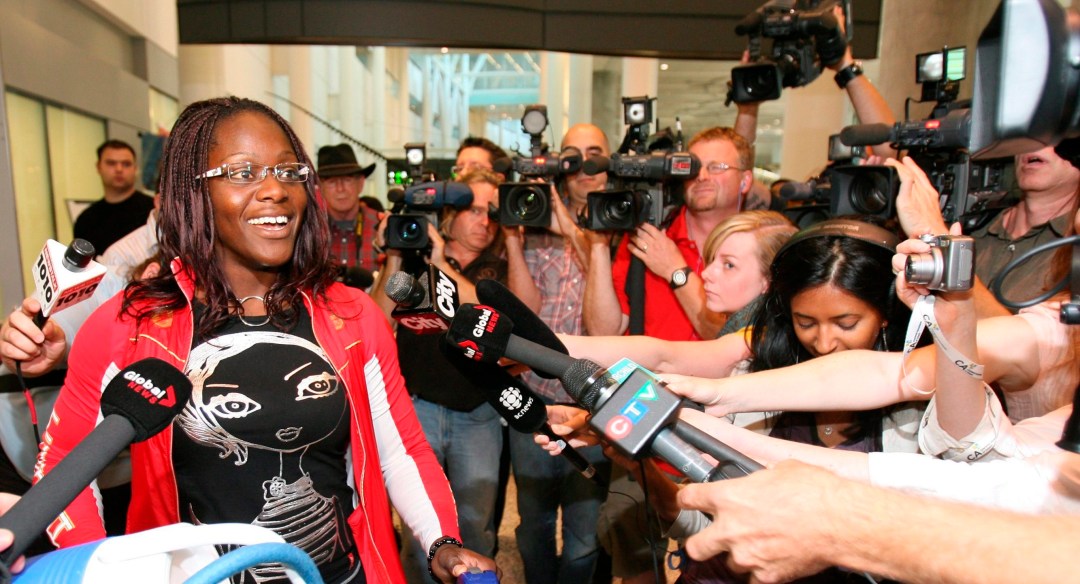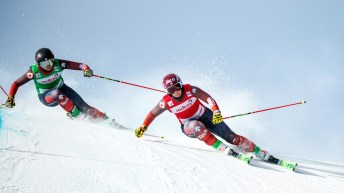A Pioneer Grappler: Meet Ohenewa Akuffo, Olympic Women’s Wrestler
Ohenewa Akuffo will make her first Olympic appearance this summer as a bright spot on the Olympic wrestling team. Here she provides insight in a sport that, for women, has long taken a back seat to others. In essence, Akuffo grew up as women’s wrestling was growing up.
You got into wrestling in high school — what prompted this?
There was work to rule at my high school and I told myself whatever sport came up first, I was going to try it. And it was wrestling and I said ‘oh no, I can’t do this.’ But I don’t like to ever give up on anything. I tried it again in Grade 9 and it was mentally and physically tough. I told myself, I want to last and be good at it. Fifteen years later, I realize that you don’t master it, you just get better. The mental and physical toughness doesn’t go away. When you get good at one thing, another thing seems to flip.
Describe your initial experiences in high school on the wrestling team.
When I started, I didn’t even know what it was. Ooh, what is this? It’s a contact sport, with different skill sets, but you have to be really tough. You have to handle disappointment in wrestling. It was an individual team sport, and that was very cool. You had a team but at the end of the day it was just you on the mat. I thought that was cool and it was different than other sports.
On the school teams and at the wrestling club, what was involved in your evolution? How many hours did you spend a week training?
Wrestling was gruelling and time-consuming. In high school, it was the longest sport. You started in September and finished in March. You had your school team, and then you had a club team. I also got into judo to better my wrestling. So I wasn’t only doing wrestling, but judo too! So wrestling is a sport that is very time consuming from the beginning. You have to be dedicated.
You were the youngest woman on the senior national team — what does that mean to you? How significant is it personally?
That was the point I realized I had something I could offer the sport. I had no clue about senior nationals and world championships in high school. I went to a university camp and the coach saw me and (was impressed) and said I should go to the senior nationals. He said nobody needs to know about me until I get there (to keep it a secret). For me, that was one achievement that made me realize my skill sets were a bit special.
It seems that you grew up with wrestling right around the time that women’s wrestling was growing up in Ontario, slowly gaining more respect. Does that make you a bit of a trailblazer?
I take honour in knowing I am a pioneer in the sport. There are many things wrestlers have now that we never had. I think about, what can I do for upcoming women’s wrestlers so they have something to look at and say, “I can do that too.” It’s an honour for me to try out for my first Olympic Games.
You were quoted as saying that women’s wrestlers had to ‘fight for every inch’ along the way.
We were trailblazers, so when we started out, for everything we had to prove we deserved it. Not even in the sense of mats, but international tournaments. We were at the time when we trying to make it an Olympic sport. So at world championships you had to work hard and present the sport to show it is worthy of the Olympic Games. At the first Pan American Games (for women’s wrestling), I was fortunate enough to go. For every “first” (for the sport) you had to show that it was a long time coming. Like we deserved to be there before, and that they were lucky to put us in now. You had to be on your game at all times, because you never know how long you would stay there.
How has Ghana influenced your wrestling career? (Akuffo, whose parents are from Ghana, brought her there to live from age three to eight.)
I think wrestling chooses you, you don’t choose the sport. You have to have a certain set of qualities to remain in the sport. I was fortunate that wrestling chose me. You also have to have a certain personality. My success in wrestling comes from the fact that I never give up. Even if you have an upset, you don’t give up on yourself. That is a quality I took from my Ghana when I saw a different culture where people don’t take things for granted. They don’t have the amenities others do. They enjoy everything they have. For myself, I won a few national championships – I don’t take them for granted. Every time I go in there, it is my first time. You never know. That’s what I took out of Ghana and seeing a different world.
What is it about wrestling that has drawn you to the sport, and kept you going for so long?
Wrestling is like a chess game where you use mind and body. It fascinates me, because it is action-reaction and you have to be on your toes all the time. It keeps you very alert, I like the chess game that you always have to know your moves. Make bad ones, and always correct yourself and keep going. The game is not done.
Describe your training, particularly as you approach a major tournament such as the Olympic Games?
Getting ready for the Olympics is a 15-year journey. On a focused end, it goes four years by four years. From the last Olympic trials, I look at what I did wrong and what was successful. Leading up to Beijing, the plan is in discipline, nutrition, strengthen and conditioning. There are a lot of mental components – that’s what makes the difference for me. It’s work! Even when you are off the mat, it’s half the job. You have to prepare yourself, scout opponents. But you also have to stay centered. The Olympics is a phenomenal experience but after it, you head back home to real life. You have to balance your life out too.
Describe your personality on the mat… and off the mat.
I am very focused. I’m a force to be reckoned with. I see it as an opportunity to display my abilities. I take it very seriously. It’s a display of my abilities and all the time my coaches and training partners have put into helping you realize your dream. I see the hard work come to fruition. Off the mat, I enjoy everything I do and live life to the moment.
What are you thinking about as you get set to make your Olympic debut?
Oh, I’m like bring it! Bring everything to that mat and enjoy every moment. It’s 15 years in the making. It’s a journey and I’ve got to learn a lot about myself.




